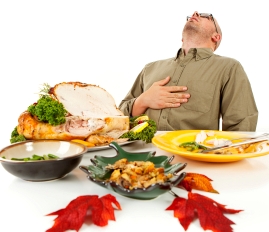- Home
- Blog
- Healthy Weight Loss
- 5 tips to stay healthy over Christmas
5 tips to stay healthy over Christmas
Written by Catherine Saxelby
on Monday, 17 December 2012.
Tagged: alcohol, balanced diet, eating out, exercise, healthy lifestyle, meal planning, sleep, weight loss, wellness

Christmas is a time traditionally given to overindulgence as Christmas drinks, office parties, end-of-year farewells and family get-togethers fill our December calendar. It's a time to connect with family and friends and there's food in abundance whether it's finger foods, buffets or those deadly Christmas food gifts like chocolate Santa's and Rocky Road.
'Tis the season to be eating
Sharing in the Christmas spirit, however, can also be a confronting and lonely time. It can be a time when our troubles are magnified. Separation from loved ones, memories of a loss and over-spending with financial strain can all have an impact on our wellbeing
There's the extra pressures of trying to get everything done in time, crowds at the shops, battling the traffic and huge expectations from families. Families who might otherwise never see each other during the year are forced together for the traditional family meal - and often find it "hard going" to mix with the fussy in-laws or overbearing cousins! The result? They eat and drink too much. We eat to calm those negative feelings.
Eat, drink but be wary
The silly season is a major contributor to overweight, with many people gaining an average 0.5kg by the end of December, according to US research. Why? Many of us let go of all dietary restraint and there are more opportunities to overeat and over-drink as part of the party celebration mood.
Christmas is hardly a time to be trying to shed excess kilos. Be realistic – a more achievable goal is to keep your weight stable over the festive season and simply not put on any.
While no-one can eat healthily 100 per cent of the time, here's my 5 tips to help you not end up looking like Santa by the end of the year:
1. Limit the pig outs!
 Keep those wildly-overindulgent days to a minimum, say three days – the day you finish up at work, Christmas Day and New Year's Eve. One or two day's real overeating (when your stomach feels as if it will burst) won't be bad but a month of festive feeding will pile on the kilos. Excess weight is gained slowly, not just from one overindulgence. Just eat sparingly the next day.
Keep those wildly-overindulgent days to a minimum, say three days – the day you finish up at work, Christmas Day and New Year's Eve. One or two day's real overeating (when your stomach feels as if it will burst) won't be bad but a month of festive feeding will pile on the kilos. Excess weight is gained slowly, not just from one overindulgence. Just eat sparingly the next day.
And I hate it how Christmas now starts in November with Santa appearing in the shopping centres and piles of puddings and shortbread everywhere. Should be a law banning Santa from appearing until the 1st of December!
2. Be selective
Eat, drink and be wary at those Christmas feasts. Survey the starters, breads, side dishes, hams, turkeys, pavlovas and Christmas puddings and decide what you absolutely MUST HAVE and what you can leave. Don't use it as an excuse to eat as much as you can or get 'your money's worth'.
3. Avoid too much alcohol
- Alcohol is packed with kilojoules (Calories) and loosens your inhibitions so you eat things you normally wouldn't like party pies or fried onion rings.
- Dilute wine and spirits with ice and mineral water, order light beer instead of full-strength, or intersperse a juice or sparkling mineral water between regular drinks.
- Don't forget the non-alcoholic options – sparkling mineral water, non-alcoholic punch, lime and soda, and iced tea. Have these if you're the host.
- And have something to eat BEFORE you drink to slow the absorption of alcohol into your system.
4. Keep moving
Keep up your exercise to counter the food. Visit the gym (usually half-empty at this time of year), take up swimming or go for a brisk walk after dinner in the cool of the evening. Walk the dog. Play cricket in the back yard. Try to get enough sleep.
5. Don't eat your way through two big meals a day
Unless you are an iron man in training, it's a sure way to pile on the weight. If you have to attend two functions, eat lightly or skip a course.
Reference quoted: Yanovski JA et al (2000) A prospective study of holiday weight gain. NEJM, 342: 861-7.
You may also be interested in...
Foodwatch
The Good Stuff
The Boring Stuff
© 2025 Foodwatch Australia. All rights reserved
Website by Joomstore eCommerce





